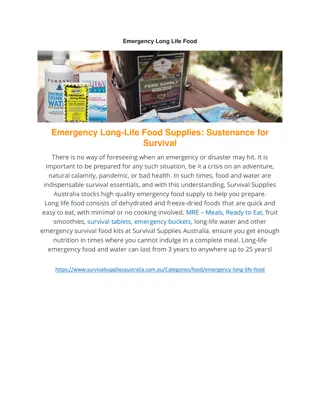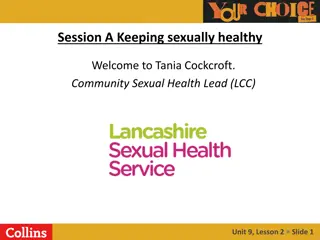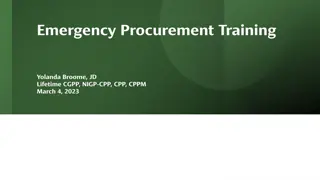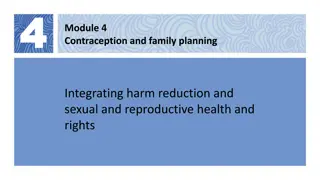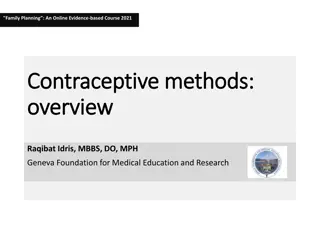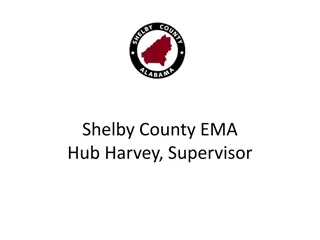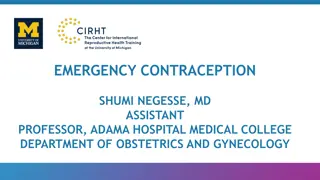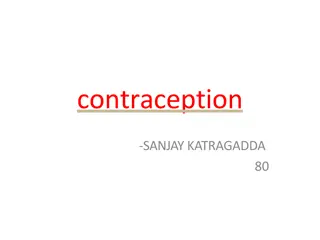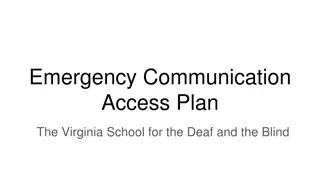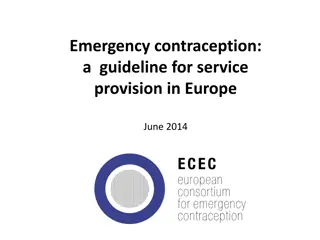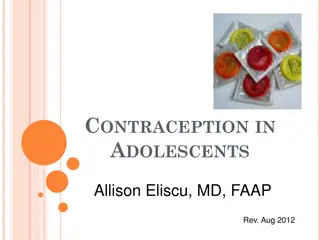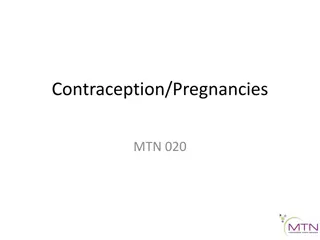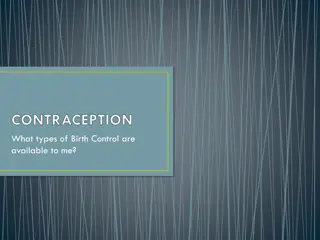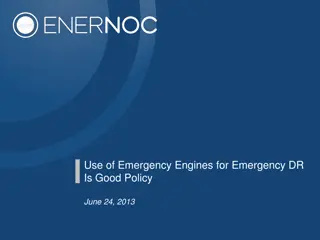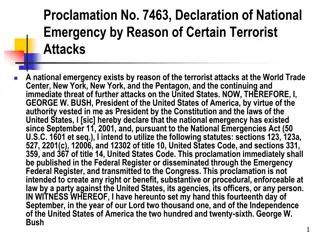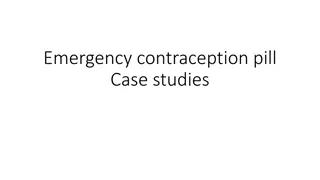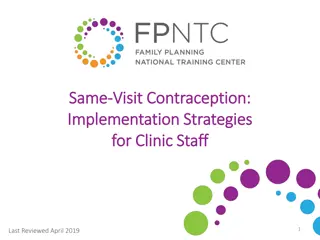Understanding Emergency Contraception: Types, Administration, and Effectiveness
Emergency Contraception (ECP) is a crucial option for preventing pregnancy after unprotected sex. This comprehensive guide covers the definition, types of ECPs, candidates, mechanisms of action, side effects, and administration details. It also emphasizes the importance of timely use and provides insights into future contraception options.
Download Presentation

Please find below an Image/Link to download the presentation.
The content on the website is provided AS IS for your information and personal use only. It may not be sold, licensed, or shared on other websites without obtaining consent from the author. Download presentation by click this link. If you encounter any issues during the download, it is possible that the publisher has removed the file from their server.
E N D
Presentation Transcript
Emergency Contraception Prepared by Dr Ruzigana George OB-Gyn CHUB
OUTLINE Objectives Introduction of Emergency Contraception (ECP) When to prescribe ECP Side effects of ECP and Management Effectiveness of ECP Choice of future contraception options Summary
Objectives 1. Define Emergency Contraceptives 2. List types of Emergency Contraceptives 3. Candidates for Emergency Contraceptives 4. Discuss Mechanisms of Action 5. Explain common side effects of ECPs
Definition Use of Drugs/Medications or a device as an emergency measure to prevent pregnancy ECPs are called Plan B, Morning After Pill or Post Coital Contraception.
Pills or Devices for Emergency Contraception Special ECPs with : Progestin (Levonorgestrel) Estrogen and Levonorgestrel Progestin Only Pills (Levonorgesrel or Norgestrel) Combined Oral Contraception with Estrogen and Progestin Intrauterine Contraceptive Device (IUCD)
When to Take ECPs? As soon as Possible after unprotected Sex Any time up to 5 days after unprotected Sex.
Who is a candidate for ECPs? All women can use ECPs safely and effectively Unprotected sex Condom rupture, slippage Missed pills 3 or more doses for combined oral contraceptive pills 1 dose of progestine-only oral contraception pill within 12 hours Sexual Assault
Dose(s) of Emergency Contraceptive pills Progesterone only dedicated product (post pill) 1.5 mg of levonorgestrel in a single dose or 0.75 mg levonorgestrel (follow with same dose 12 hours later) Most recommended ECPs
Dose(s) ECPs (contd) Estrogen progestin dedicated product 0.1 mg ethinyl estradiol + 0.5 mg levonorgestrel (follow with same dose 12 hours later) Progestin-only pills with levonorgestrel or norgestrel Levonorgestrel pills 1.5 mg in a single dose Norgestrel pills 3 mg in a single dose
Dose(s) ECPs (contd) Combined oral contraceptives 0.1 mg ethinyl estradiol + 0.5 mg levonorgestrel (follow with same dose 12 hours later) 0.1 mg ethinyl estradiol + 1 mg norgestrel (follow with same dose 12 hours later) 0.1 mg ethinyl estradiol + 2 mg norethindrone (follow with same dose 12 hours later)
Side effects ECPs Bleeding pattern changes earlier or later Nausea and sometimes vomiting If any GI Side effects from Emergency Contraceptive use can be offset by Antiemetic medications.
Misconceptions about ECPs Emergency contraceptive pills: Do not cause abortion Do not cause birth defects if pregnancy occurs Are not dangerous to a woman s health Do not promote risky sexual behavior Do not make women infertile
Follow-up No routine return visit is required. However, a woman should seek follow-up care if: She has missed her Menses by more than one week. She presents with signs/symptoms of pregnancy.
Planning for Future Contraception ECPs does not protect from future pregnancy Give options for all types of contraception Invite her to come back anytime If possible, give her more ECPs (for future use)
Planning for Future Contraception Should women use ECPs as a regular method of contraception? No Nearly all other contraceptive methods are more effective in preventing pregnancy. Women who use ECPs regularly are at high risk to have unintended pregnancy.
IUCD Should be inserted within 5 Days Highly effective Can remain in place for up to 10 years Good option for long-term contraception
Contraindications for IUCD Uterine anomalies Acute pelvic inflammatory disease or in the past 3 months Pelvic malignancies: Cervical or endometrial cancer Undiagnosed abnormal vaginal bleeding Allergies to copper
Other Methods of ECPs Ulipristal acetate Highly effective and well-tolerated Can be taken up to 5 days after unprotected sex Believed to be more effective than levonorgestrel ECPs Mifepristone Highly effective, with few side-effects
Summary Emergency contraceptives/IUCD prevent pregnancy when taken up to 5 days after unprotected sex Levonorgestrel-only dedicated is the most recommended type of ECPs Emergency contraceptives do not disrupt an existing pregnancy ECPs are safe for all women ECPs are not recommended as regular contraceptive methods ECPs do not protect against Sexually transmitted Infections (STIs) including HIV. If there is a risk of STI/HIV, the correct and consistent use of condoms is recommended.





